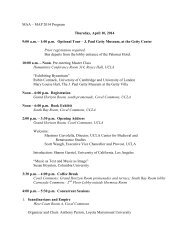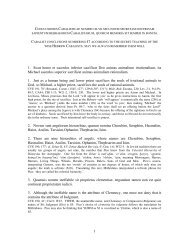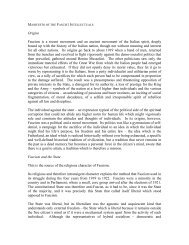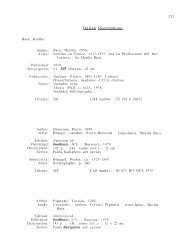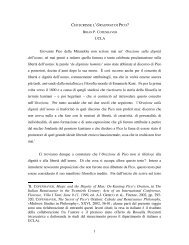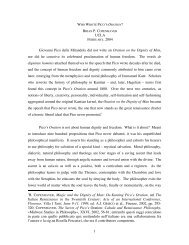1 (1) Pythagoras of Samos instructed the region of Italy once called ...
1 (1) Pythagoras of Samos instructed the region of Italy once called ...
1 (1) Pythagoras of Samos instructed the region of Italy once called ...
Create successful ePaper yourself
Turn your PDF publications into a flip-book with our unique Google optimized e-Paper software.
(5) No one, however, ei<strong>the</strong>r Latin or Greek, has ever said ‘deity,’ or in Greek <strong>the</strong>otês – at<br />
least none <strong>of</strong> those whom we call ‘<strong>the</strong> ancients.’ For nei<strong>the</strong>r ‘God’ nor <strong>the</strong>os signifies a<br />
quality. Our people said ‘divinity’ from ‘divine,’ <strong>the</strong>refore, and <strong>the</strong> Greeks <strong>the</strong>iotês from<br />
<strong>the</strong>ios. In any case, it would also have been pointless to adopt ano<strong>the</strong>r word with <strong>the</strong><br />
same meaning. And yet we read it in Paul’s Letter to <strong>the</strong> Colossians, though I do not<br />
know if it is found in every text or was corrupted by copyists and <strong>the</strong>n followed by <strong>the</strong><br />
Church Fa<strong>the</strong>rs. Those who translated it into our language have ‘divinity’ ra<strong>the</strong>r than<br />
‘deity’ ei<strong>the</strong>r because <strong>the</strong> reading <strong>the</strong>y had was <strong>the</strong>iotêtos ra<strong>the</strong>r than <strong>the</strong>otêtos or because<br />
<strong>the</strong>y had seen ‘deity’ ra<strong>the</strong>r than ‘divinity’ in none <strong>of</strong> <strong>the</strong> Latin authors. But as I said, <strong>the</strong><br />
Church Fa<strong>the</strong>rs, both <strong>the</strong> Greeks and our own, used ‘deity,’ doing so when it was clearly<br />
unnecessary, lacking ancient authority and with no basis in analogy. 88<br />
(7) In <strong>the</strong> seventh book <strong>of</strong> <strong>the</strong> City <strong>of</strong> God, Augustine had only this to say: ‘it does not<br />
<strong>of</strong>fend writers <strong>of</strong> our language to use this word “deity” to translate more distinctly from<br />
Greek what <strong>the</strong>y call <strong>the</strong>otês.’ 89 But I see that you were <strong>of</strong>fended, Augustine, since in a<br />
work so vast I never find you using that word. 90 Why does one read nothing about <strong>the</strong><br />
o<strong>the</strong>r word, which exists in <strong>the</strong> ancient authors – <strong>the</strong>iotêtos, I mean – and agrees with <strong>the</strong><br />
<strong>the</strong>ory <strong>of</strong> grammar? Why did you not mention it? Because you were not an excellent<br />
Hellenist?<br />
Yet you were an excellent Latinist. Why did you not talk about rules for <strong>the</strong>se words?<br />
Do <strong>the</strong>y differ at all? (8) Thomas Aquinas, who was no better at Latin than you were at<br />
Greek, ventured to do so after you, writing in his Commentary on <strong>the</strong> Epistle to <strong>the</strong><br />
Romans: ‘Because <strong>of</strong> this he said “divinity,” which signifies participation, ra<strong>the</strong>r than<br />
“deity,” which signify’s God’s essence.’ 91 Where else in Paul did you read ‘deity,’<br />
Thomas, since you say that he used <strong>the</strong> word ‘divinity’ here. I will not mention how<br />
absurd a reading ‘deity’ would be in <strong>the</strong> passage, ‘Everlasting his power and divinity.’ 92<br />
What author, what book, what method taught you this distinction? Why did you not<br />
listen to Boethius, who proposed a general <strong>the</strong>ory on this topic? 93<br />
(9) I would say <strong>the</strong> same about ‘identity,’ plainly a word as absurd as ‘itness’ would be if<br />
based on ‘it,’ and about tautotês, a word whose strangeness I might perhaps endure if – as<br />
88<br />
Valla’s point is that abstract nouns <strong>of</strong> quality must derive from adjectives <strong>of</strong> quality, not from nouns that<br />
do not signify quality; hence, ‘divinity’ must come from <strong>the</strong> adjective ‘divine,’ divinus or <strong>the</strong>ios, not from<br />
<strong>the</strong> noun ‘God,’ deus or <strong>the</strong>os; this rules out ‘deity’ but allows ‘divinity’ in both Latin and Greek. Zippel<br />
notes that <strong>the</strong> reading at Col. 2:9 in modern editions <strong>of</strong> <strong>the</strong> New Testament is <strong>the</strong> <strong>the</strong>otêtos to which Valla<br />
objects but that <strong>the</strong> Vulgate has divinitatis. Modern dictionaries list both <strong>the</strong>otês and <strong>the</strong>iotês as classical<br />
usage, thus contradicting Valla. Zippel cites Occam, Sum. log. 1.6; Paul. Ven. Log. ma. 2.13 (Ven., 1499,<br />
175v, 176r), but Valla seems to be talking about <strong>the</strong> Fa<strong>the</strong>rs as next after <strong>the</strong> ancients. Deitas appears in<br />
Christian writers as early as Tertullian, Arnobius and Lactantius and <strong>the</strong>n becomes very common.<br />
89<br />
Zippel cites Aug. DCD 7.1; <strong>the</strong> quotation is not exact.<br />
90<br />
Augustine also uses deitas in DCD 10.1 and 11.29 and <strong>of</strong>ten in o<strong>the</strong>r works.<br />
91<br />
Zippel cites Aquinas, In omn. S. Pauli Apost. epistolas comment. 1.6.<br />
92<br />
Zippel cites Rom. 1:20.<br />
93<br />
Zippel refers to <strong>the</strong> Boethius passage below ???<br />
24<br />
2/21/05 9:35 PM 24/44



